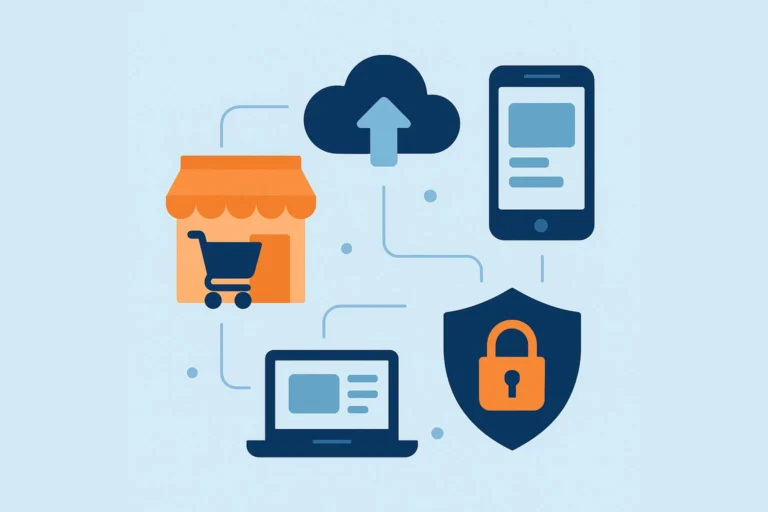The way businesses operate in India has changed drastically over the past decade — and that pace has only accelerated since 2020. For traditional businesses still relying on offline processes, manual systems, or paper records, digital transformation may sound overwhelming. But in 2025, it’s not only achievable — it’s essential.
Digital transformation is no longer just a buzzword. It’s about using technology to improve how your business operates, serves customers, and grows. Whether you’re in retail, manufacturing, education, healthcare, or services — going digital helps reduce costs, enhance customer experience, and make your business more competitive.
In this blog, we break down exactly where traditional Indian businesses should start their digital journey and how the right IT partner can make the process smooth and successful.
Why Digital Transformation Matters in 2025
Today’s customers expect speed, convenience, and online access. They want to:
Find your business online
Get quick support and updates
Place orders or make inquiries digitally
Trust that their data is secure
If you’re still operating on spreadsheets, paper invoices, or relying solely on in-person interactions, you’re already behind.
Digital transformation helps you:
Serve customers faster and better
Reduce manual work and errors
Track business performance in real time
Stay compliant with regulations
Compete with modern businesses
Expand beyond local markets
Government initiatives like Digital India and Udyam have made it easier for SMEs to access digital tools at subsidized rates — further encouraging modernization.
Step 1: Build a Strong Online Presence
The first and easiest step in your digital journey is to establish a professional presence online.
This includes:
Creating a website that reflects your products or services
Registering a domain and setting up business emails
Optimizing for search engines (SEO) to help people find you
Your website is your digital storefront. Even if you don’t sell online, people will still search for your brand, verify your legitimacy, and compare your offerings before contacting you.
A good business website in 2025 should be:
Mobile-friendly and fast
Clear about what you offer
Connected to WhatsApp, phone, email, or chat
Secure (HTTPS-enabled)
Regularly updated with fresh content
Include essential features like contact forms, inquiry buttons, Google Maps integration, and social media links. Add testimonials, photos, and case studies to build trust.
Step 2: Switch to Professional Email and Cloud Tools
Still using a Gmail or Yahoo ID for business communication? It’s time to upgrade. A professional email address (like [email protected]) builds credibility and provides access to modern productivity tools.
Two major platforms lead the market:
Google Workspace: Gmail, Google Docs, Drive, Meet, Calendar, etc.
Microsoft 365: Outlook, Word, Excel, Teams, OneDrive, etc.
These tools help your business:
Collaborate in real time
Store data securely in the cloud
Schedule and manage meetings
Access files anytime, anywhere, across devices
Cloud platforms ensure continuity and security — critical for hybrid work setups now common across industries.
Step 3: Digitize Internal Operations
Manual paperwork, ledger books, or untracked phone calls don’t scale. Automation doesn’t replace people — it empowers them to work faster, make fewer errors, and focus on growth.
Start by identifying areas to digitize:
Billing and invoicing
Customer relationship management (CRM)
Inventory tracking
Appointment scheduling
Task assignments and follow-ups
Simple, cost-effective tools like TallyPrime, Zoho CRM, RazorpayX, or industry-specific ERPs can drastically improve efficiency and provide real-time insights for better decision-making.
Step 4: Secure Your Business
One of the biggest concerns for businesses going digital is security — and rightly so. In 2025, cyberattacks on small businesses are rising. The good news is that robust security is now simple and affordable when planned properly.
Protect your business by:
Using licensed, updated software
Enabling multi-factor authentication (MFA)
Automating data backups via cloud services
Installing antivirus, firewalls, and endpoint protection
Training employees on phishing and scam awareness
It’s also wise to invest in cyber insurance and create a disaster recovery plan. Compliance with India’s data protection laws is increasingly vital, especially for sectors like healthcare, finance, and education.
Step 5: Accept Online Payments and Go Cashless
Digital payments aren’t just for e-commerce. Every business — from wholesalers to clinics to coaching centers — can benefit from faster, traceable payments.
Integrate secure payment solutions such as:
Razorpay for invoicing
PayU for recurring payments
Google Pay for Business for QR-based transactions
PhonePe, BharatPe, or UPI-enabled banking
Going cashless improves:
Cash flow tracking
Customer convenience
On-time payments
It also simplifies tax reporting and reconciliation.
Step 6: Stay Connected with Customers
Digitally transformed businesses nurture stronger customer relationships. Once your backend systems are in place, focus on engagement and communication.
Use tools like:
WhatsApp Business for automated replies, catalogs, and alerts
Email newsletters through Mailchimp or Zoho Campaigns
Google Reviews and social media for brand visibility
CRM platforms to follow up with leads and clients
Consider developing customer portals, self-service dashboards, or online booking systems — all of which enhance convenience and build long-term trust.
Step 7: Get Expert IT Support and Guidance
You don’t have to navigate digital transformation alone. The most successful transitions happen with expert guidance.
That’s where KITSPL comes in. We help traditional businesses modernize seamlessly through:
Website and domain setup
Google Workspace and Microsoft 365 licensing and support
Secure hosting and data protection
Backup and disaster recovery solutions
Ongoing technical support and staff training
Cybersecurity assessments and compliance guidance
We act as your digital transformation partner — not just a vendor.
Final Thoughts
Digital transformation isn’t about doing everything at once — it’s about starting small, solving real problems, and using technology as a growth partner.
The future of Indian businesses is digital. By taking the first steps today, you ensure your company is competitive, efficient, and future-ready.
Book a Free Consultation with KITSPL and let’s build a digital roadmap tailored to your business.


